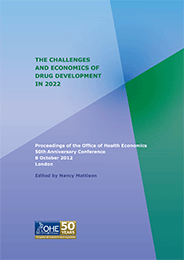Sign up to our newsletter Subscribe
Challenges and Solutions for Budget Impact Analysis of Gene Therapies

Sign up to our newsletter Subscribe

A new publication from the Office of Health Economics captures the views of thought leaders from around the world about the scientific and economic climate for drug development by 2022. Based on OHE’s 50th anniversary conference, it reflects the perspectives…

A new publication from the Office of Health Economics captures the views of thought leaders from around the world about the scientific and economic climate for drug development by 2022. Based on OHE’s 50th anniversary conference, it reflects the perspectives of payers, regulatory and HTA agencies, academia, the non-profit sector and the biopharmaceutical industry.
A new publication from the Office of Health Economics captures the views of thought leaders from around the world about the scientific and economic climate for drug development by 2022. Based on OHE’s 50th anniversary conference, it reflects the perspectives of payers, regulatory and HTA agencies, academia, the non-profit sector and the biopharmaceutical industry.
Four major themes stood out in the conference discussions, as reported in this publication.
1. Health care will be radically transformed as “precision” medicines plug into the specific genetic makeup of both patients and diseases, paired with increasingly powerful and convenient diagnostics.
2. Innovation will be dramatically different as firms more fully integrate new genome-based technologies, fit processes and structures to new development paradigms, and routinely engage in close collaboration with a diversity of public and private partners.
3. Approval, pricing and financing regimes must change to realize the promise of the new science. Regulatory bodies need both personnel and procedures capable of evaluating, for example, gene-based treatments or medicines paired with diagnostics. For payers, the more targeted treatments require new approaches to HTA and pricing, even pricing by indication in some cases. For policy makers, the demographics of ageing make innovation in financing essential.
4. Innovation and markets will be truly global as demand evolves in emerging markets and as new technologies promise more effective treatments for the scourges of the developing world. Global approaches to pricing and reimbursement are essential to making medicines available to more people and to continuing innovation.
The UK has been a major source of innovation in the medical sciences for generations. Recommendations from the conference for ensuring this continues include making full use of the unique resources of the NHS and creating vigorous clusters of research excellence.
OHE’s Director, Prof. Adrian Towse, said 'What struck me most about the conference discussions was the clear consensus that radically different, collaborative ways of working—involving all stakeholders—are essential to reaping the incredible promise of the new medicine. This was so despite the markedly diverse backgrounds of the participants'.
Download Mattison, N. ed. (2013) The Challenges and Economics of Drug Development in 2022. London: Office of Health Economics.
An error has occurred, please try again later.
This website uses cookies so that we can provide you with the best user experience possible. Cookie information is stored in your browser and performs functions such as recognising you when you return to our website and helping our team to understand which sections of the website you find most interesting and useful.
Strictly Necessary Cookie should be enabled at all times so that we can save your preferences for cookie settings.
If you disable this cookie, we will not be able to save your preferences. This means that every time you visit this website you will need to enable or disable cookies again.
This website uses Google Analytics to collect anonymous information such as the number of visitors to the site, and the most popular pages.
Keeping this cookie enabled helps us to improve our website.
Please enable Strictly Necessary Cookies first so that we can save your preferences!


